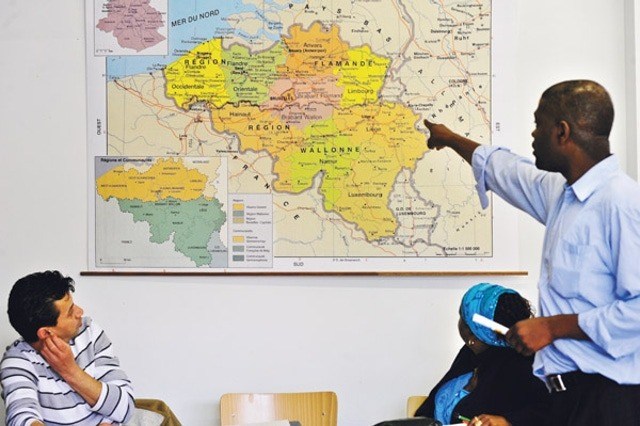The Flemish Region's integration exam for newcomers to Belgium – which deals with topics such as euthanasia, adoption and LGBTQ rights – will soon have the pass threshold raised to 82%, starting from 1 March.
For all non-EU citizens arriving in Flanders, the integration course and test are mandatory. EU citizens (and Ukrainian refugees) can participate voluntarily. After the introduction of the standard exam, 95% of participants passed – meaning the bar can safely be raised, said Flemish Minister for Coexistence Bart Somers.
"The course material and exam questions remain the same, and people will also still be obliged to follow 60 hours of classes. Only the percentage needed to pass the exam will go up," Vincent Verbeecke, spokesperson for Somers, confirmed to The Brussels Times.
The Flemish test has only been standardised since 1 March 2022, meaning that it looks exactly the same across the region. From 1 March 2023, people will have to achieve a score of 9 out of 11 on the "fundamental norms and values" section of the Flemish civic integration exam – bringing the passing grade to 82%.
'Raising the bar'
The courses aim to provide a cultural and linguistic background to people arriving on Belgian territory by dealing with topics such as same-sex couples' rights to get married and have (or adopt) children, euthanasia for those who are terminally ill and what constitutes discrimination on the rental or labour market.
"When it comes to our basic fundamental values, answering half the questions correctly is insufficient. I raise the bar, as I want newcomers to understand very well the society they are arriving in and the fundamental values that apply here. Newcomers need to know this," Somers said.
Civic integration courses are enforced as a tool to ensure people coming from outside of Europe can "take an active part in society," with the presumption being that they diverge too much from European values and societies.
However, many criticisms have been levelled at these programmes for forcing an image of "other" onto non-Europeans, with critics saying integration is a process that works both ways, and can also be achieved through means such as access to decent jobs and education for young people.
"People decide for themselves whether they feel Flemish and what their other identities are. But integration ensures that newcomers have the insight and knowledge to function well in our society. They are taught fundamental values and knowledge," Somers clarified on Twitter.
In the first section of Flanders' text, people will soon have to answer nine (instead of six) correctly in order to pass. For the 30 other questions, which deal with all kinds of "practical" matters such as living, working, education and health, the threshold remains at 16 correctly completed questions.
The civic integration exam is preceded by a 60-hour "social orientation" course, which people can take in person or online. Anyone who fails to (digitally) turn up for the course commits a breach of the "civic integration pathway" and risks fines of up to €5,000.
Related News
- Becoming Belgian: Who is eligible for citizenship, and how to apply
- Compulsory exam for Belgian citizenship proposed by Flemish party
- Integration courses for newcomers will be mandatory in Brussels from June
Those who do not immediately pass the civic integration exam do get re-takes, similar to a driving exam, which you can also take several times. Those who are recognised by an external committee as "cognitively impaired" are given an exemption and do not have to pass the test.
In 2022, about 20,000 internationals who moved to Belgium signed an integration contract, of which the exam is an important part. About half of those were compulsory course participants, the others took the course voluntarily. People who pass the exam are therefore officially recognised as Flemish, with Somers' office believing this will increase their chances in the labour market,.

